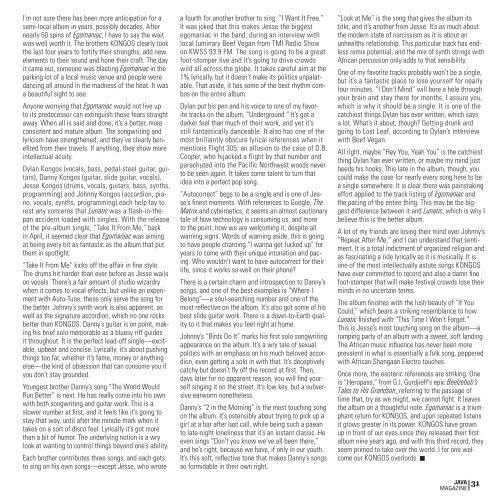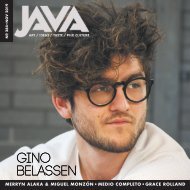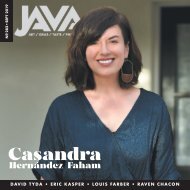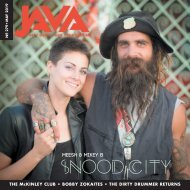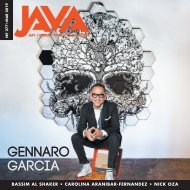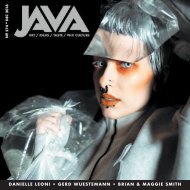Java.July.2016
You also want an ePaper? Increase the reach of your titles
YUMPU automatically turns print PDFs into web optimized ePapers that Google loves.
I’m not sure there has been more anticipation for a<br />
semi-local album in years, possibly decades. After<br />
nearly 50 spins of Egomaniac, I have to say the wait<br />
was well worth it. The brothers KONGOS clearly took<br />
the last four years to fortify their strengths, add new<br />
elements to their sound and hone their craft. The day<br />
it came out, someone was blasting Egomaniac in the<br />
parking lot of a local music venue and people were<br />
dancing all around in the madness of the heat. It was<br />
a beautiful sight to see.<br />
Anyone worrying that Egomaniac would not live up<br />
to its predecessor can extinguish those fears straight<br />
away. When all is said and done, it’s a better, more<br />
consistent and mature album. The songwriting and<br />
lyricism have strengthened, and they’ve clearly benefited<br />
from their travels. If anything, they show more<br />
intellectual acuity.<br />
Dylan Kongos (vocals, bass, pedal-steel guitar, guitars),<br />
Danny Kongos (guitar, slide guitar, vocals),<br />
Jesse Kongos (drums, vocals, guitars, bass, synths,<br />
programming) and Johnny Kongos (accordion, piano,<br />
vocals, synths, programming) each help lay to<br />
rest any concerns that Lunatic was a flash-in-thepan<br />
accident loaded with singles. With the release<br />
of the pre-album single, “Take It From Me,” back<br />
in April, it seemed clear that Egomaniac was aiming<br />
at being every bit as fantastic as the album that put<br />
them in spotlight.<br />
“Take It From Me” kicks off the affair in fine style.<br />
The drums hit harder than ever before as Jesse wails<br />
on vocals. There’s a fair amount of studio wizardry<br />
when it comes to vocal effects, but unlike an experiment<br />
with Auto-Tune, these only serve the song for<br />
the better. Johnny’s synth work is also apparent, as<br />
well as the signature accordion, which no one rocks<br />
better than KONGOS. Danny’s guitar is on point, making<br />
his brief solo memorable as a bluesy riff guides<br />
it throughout. It is the perfect lead-off single—excitable,<br />
upbeat and concise. Lyrically, it’s about pushing<br />
things too far, whether it’s fame, money or anything<br />
else—the kind of obsession that can consume you if<br />
you don’t stay grounded.<br />
Youngest brother Danny’s song “The World Would<br />
Run Better” is next. He has really come into his own<br />
with both songwriting and guitar work. This is a<br />
slower number at first, and it feels like it’s going to<br />
stay that way, until after the minute mark when it<br />
takes on a sort of disco feel. Lyrically it’s got more<br />
than a bit of humor. The underlying notion is a wry<br />
look at wanting to control things beyond one’s ability.<br />
Each brother contributes three songs, and each gets<br />
to sing on his own songs—except Jesse, who wrote<br />
a fourth for another brother to sing: “I Want It Free.”<br />
It was joked that this makes Jesse the biggest<br />
egomaniac in the band, during an interview with<br />
local luminary Beef Vegan from TMI Radio Show<br />
on KWSS 93.9 FM. The song is going to be a great<br />
foot-stomper live and it’s going to drive crowds<br />
wild all across the globe. It takes careful aim at the<br />
1% lyrically, but it doesn’t make its politics unpalatable.<br />
That aside, it has some of the best rhythm combos<br />
on the entire album.<br />
Dylan put his pen and his voice to one of my favorite<br />
tracks on the album, “Underground.” It’s got a<br />
darker feel than much of their work, and yet it’s<br />
still fantastically danceable. It also has one of the<br />
most brilliantly obscure lyrical references when it<br />
mentions Flight 305: an allusion to the case of D.B.<br />
Cooper, who hijacked a flight by that number and<br />
parachuted into the Pacific Northwest woods never<br />
to be seen again. It takes some talent to turn that<br />
idea into a perfect pop song.<br />
“Autocorrect” begs to be a single and is one of Jesse’s<br />
finest moments. With references to Google, The<br />
Matrix and cybernetics, it seems an almost cautionary<br />
tale of how technology is consuming us, and more<br />
to the point, how we are welcoming it, despite all<br />
warning signs. Words of warning aside, this is going<br />
to have people chanting “I wanna get fucked up” for<br />
years to come with their unique intonation and pacing.<br />
Who wouldn’t want to have autocorrect for their<br />
life, since it works so well on their phone?<br />
There is a certain charm and introspection to Danny’s<br />
songs, and one of the best examples is “Where I<br />
Belong”—a soul-searching number and one of the<br />
most reflective on the album. It’s also got some of his<br />
best slide guitar work. There is a down-to-Earth quality<br />
to it that makes you feel right at home.<br />
Johnny’s “Birds Do It” marks his first solo songwriting<br />
appearance on the album. It’s a wry tale of sexual<br />
politics with an emphasis on his much beloved accordion,<br />
even getting a solo in with that. It’s deceptively<br />
catchy but doesn’t fly off the record at first. Then,<br />
days later for no apparent reason, you will find yourself<br />
singing it on the street. It’s low key, but a subversive<br />
earworm nonetheless.<br />
Danny’s “2 in the Morning” is the most touching song<br />
on the album. It’s ostensibly about trying to pick up a<br />
girl at a bar after last call, while being such a paean<br />
to late-night loneliness that it’s an instant classic. He<br />
even sings “Don’t you know we’ve all been there,”<br />
and he’s right, because we have, if only in our youth.<br />
It’s this soft, reflective tone that makes Danny’s songs<br />
so formidable in their own right.<br />
“Look at Me” is the song that gives the album its<br />
title, and it’s another from Jesse. It’s as much about<br />
the modern state of narcissism as it is about an<br />
unhealthy relationship. This particular track has endless<br />
remix potential, and the mix of synth strings with<br />
African percussion only adds to that sensibility.<br />
One of my favorite tracks probably won’t be a single,<br />
but it’s a fantastic place to lose yourself for nearly<br />
four minutes. “I Don’t Mind” will bore a hole through<br />
your brain and stay there for months, I assure you,<br />
which is why it should be a single. It is one of the<br />
catchiest things Dylan has ever written, which says<br />
a lot. What’s it about, though? Getting drunk and<br />
going to Lost Leaf, according to Dylan’s interview<br />
with Beef Vegan.<br />
All right, maybe “Hey You, Yeah You” is the catchiest<br />
thing Dylan has ever written, or maybe my mind just<br />
heeds his hooks. This late in the album, though, you<br />
could make the case for nearly every song here to be<br />
a single somewhere. It is clear there was painstaking<br />
effort applied to the track listing of Egomaniac and<br />
the pacing of the entire thing. This may be the biggest<br />
difference between it and Lunatic, which is why I<br />
believe this is the better album.<br />
A lot of my friends are losing their mind over Johnny’s<br />
“Repeat After Me,” and I can understand that sentiment.<br />
It is a total indictment of organized religion and<br />
as fascinating a ride lyrically as it is musically. It is<br />
one of the most intellectually astute songs KONGOS<br />
have ever committed to record and also a damn fine<br />
foot-stomper that will make festival crowds lose their<br />
minds in no uncertain terms.<br />
The album finishes with the lush beauty of “If You<br />
Could,” which bears a striking resemblance to how<br />
Lunatic finished with “This Time I Won’t Forget.”<br />
This is Jesse’s most touching song on the album—a<br />
romping party of an album with a sweet, soft landing.<br />
The African music influence has never been more<br />
prevalent in what is essentially a folk song, peppered<br />
with African Shangaan Electro touches.<br />
Once more, the esoteric references are striking. One<br />
is “Heropass,” from G.I. Gurdjieff’s epic Beelzebub’s<br />
Tales to His Grandson, referring to the passage of<br />
time that, try as we might, we cannot fight. It leaves<br />
the album on a thoughtful note. Egomaniac is a triumphant<br />
return for KONGOS, and upon repeated listens<br />
it grows greater in its power. KONGOS have grown<br />
up in front of our eyes since they released their first<br />
album nine years ago, and with this third record, they<br />
seem primed to take over the world. I for one welcome<br />
our KONGOS overlords.<br />
JAVA 31<br />
MAGAZINE


